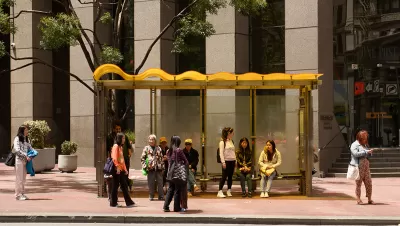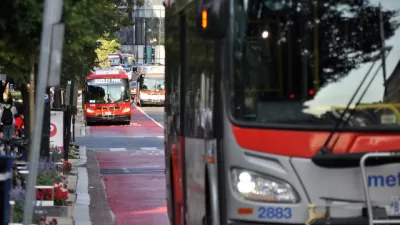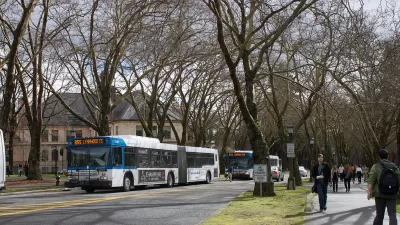As commuter ridership continues to lag due to the pandemic, transit systems are adjusting to better serve the essential workers and transit-dependent households who need them the most.

While transit ridership plunged during the pandemic, millions of workers in industries deemed 'essential' continued to rely on it. Unsurprisingly, writes Aarian Marshall, these jobs skew disproportionately to people of color. "An analysis from the APTA found that white men were more likely to have given up transit during the pandemic; people of color, people who spoke Spanish, and women did not."
As Marshall notes, "Agencies are legally obligated to provide equitable service for everyone in their community." But that hasn't always been the case in practice, with most systems focused on suburban commuters.
As 2020 wore on, transit agencies around the country began making changes to better serve the people who need them most. In Pittsburgh, "officials moved resources away from 'commuter' routes—those serving people who worked traditional office jobs on traditional schedules, who now were mostly at home—and toward lower-income neighborhoods, those with larger shares of people of color and households without cars." The Port Authority also added more service at off-peak hours and on weekends.
Other agencies have taken similar steps to address transportation equity and improve their service in underserved neighborhoods by expanding service, reorganizing routes, reducing or eliminating fares, and investing in PR campaigns to get the word out about service changes.
FULL STORY: Public Transit Systems Refocus on Their Core Riders

Planetizen Federal Action Tracker
A weekly monitor of how Trump’s orders and actions are impacting planners and planning in America.

Chicago’s Ghost Rails
Just beneath the surface of the modern city lie the remnants of its expansive early 20th-century streetcar system.

San Antonio and Austin are Fusing Into one Massive Megaregion
The region spanning the two central Texas cities is growing fast, posing challenges for local infrastructure and water supplies.

Since Zion's Shuttles Went Electric “The Smog is Gone”
Visitors to Zion National Park can enjoy the canyon via the nation’s first fully electric park shuttle system.

Trump Distributing DOT Safety Funds at 1/10 Rate of Biden
Funds for Safe Streets and other transportation safety and equity programs are being held up by administrative reviews and conflicts with the Trump administration’s priorities.

German Cities Subsidize Taxis for Women Amid Wave of Violence
Free or low-cost taxi rides can help women navigate cities more safely, but critics say the programs don't address the root causes of violence against women.
Urban Design for Planners 1: Software Tools
This six-course series explores essential urban design concepts using open source software and equips planners with the tools they need to participate fully in the urban design process.
Planning for Universal Design
Learn the tools for implementing Universal Design in planning regulations.
planning NEXT
Appalachian Highlands Housing Partners
Mpact (founded as Rail~Volution)
City of Camden Redevelopment Agency
City of Astoria
City of Portland
City of Laramie





























